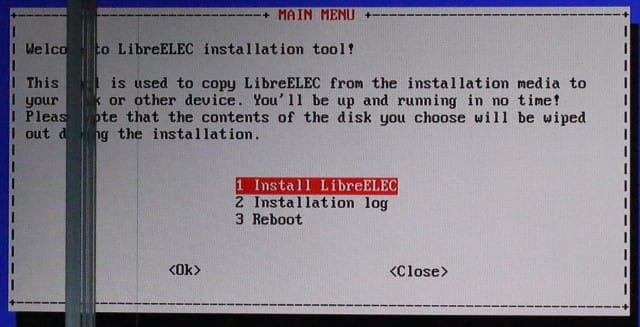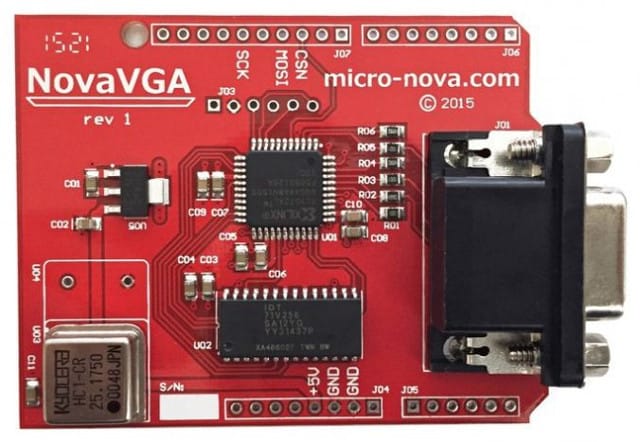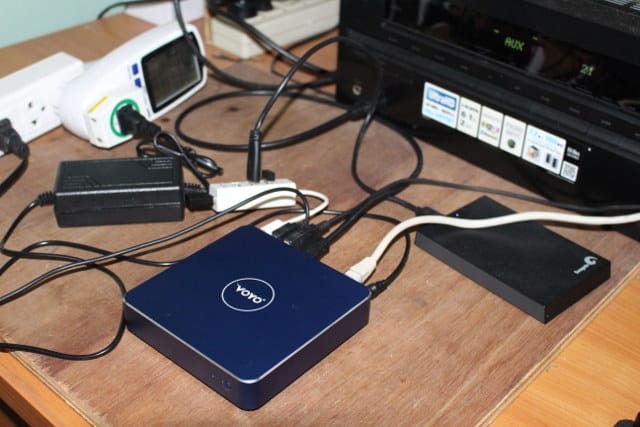I’ve just posted Voyo V1 VMac Mini review with Windows 10 this morning, and at the end I mentioned I quickly tried to run Ubuntu 16.04 without success. Reader Piotr who also happens to be a LibreELEC together with about 65 other team members, noticed it, provided me a link to a development version of LibreELEC 8.0 (mirror link) working with Apollo Lake processors, and explained Ubuntu was not working because Linux needs updated Mesa and Intel drivers. The image is based on Linux 4.10-rc5 with the necessary drivers and Kodi 17. The changes were mostly made by FernetMenta (Rainer Hochecker), and will be merged in Linux 4.10 and Mesa 17.0. He also implemented 10-bit HEVC support that will officially be available in Kodi 18 only and found in daily builds. So let’s try this out. After downloading LibreELEC-Intel.x86_64-8.0-devel-20170130110609-r25167-gd210441.img.gz, I tried to flash it (N.B.: no need to extract it) […]
NovaVGA Shield Adds VGA Output to Arduino Boards
Arduino boards are convenient to control I/Os, link LEDs, and display info on small LCD displays, but if you want to output data to a larger monitor, it’s a bit more complex. NovaVGA shield for Arduino simplify the task of outputting data to a VGA monitor over SPI. NovaVGA shield hardware specifications: CPLD – Xilinx XC9572XL CPLD, user programmable via JTAG interface. SRAM Framebuffer – 160×120 pixels @ 6-bit color (2^6 = 64 possible colors) VGA Output – 640×480 @ 60Hz physical resolution (25.175MHz pixel clock) Interface with MCU – SPI mode 1 interface (consumes only three Arduino pins) Header pins not included MicroNova provides an Arduino library with various examples such as color palette, Mandelbrot, Tetris and text console, as well as a user’s guide and PDF schematics that can all be downloaded directly on the product page. NovaVGA shield sells for $29 on Tindie or directly on MicroNova […]
Voyo (V1) VMac Mini Apollo Lake Mini PC Review – Part 2: Windows 10
Voyo VMac Mini, also sometimes referred to just Voyo V1, is an actively cooled mini PC powered by Intel Celeron N3450 or Pentium N4200 Apollo Lake processor. I’ve received samples for both, and already taken pictures of the device and motherboard. So in the second part I’ll review the mini PC checking out system info, running some benchmarks on both, and see how it performs as an entry-level desktop PC. Voyo VMac Mini Setup and System Information Setup is pretty straightforward, as you just need to connect mouse and keyboard, Ethernet, the mini HDMI to HDMI cable, optionally the included USB WiFi dongle, the power supply, and finally press the power button to get to Windows 10 desktop logged in as “admin” user in about 30 seconds. Some Apollo Lake mini PCs support HDMI 2.0 video output, but this requires a DisplayPort to HDMI 2.0 bridge chip, which not included […]




